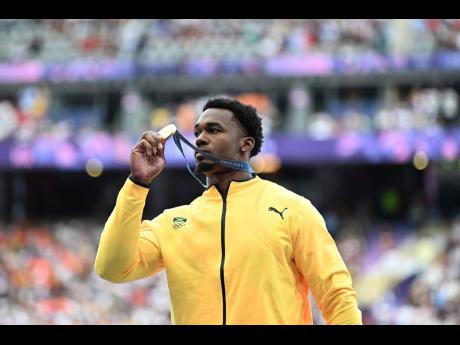Editorial | Being accountable for sports
The confirmation that two of the island’s medallists from the last Olympics, throwers Roje Stona and Rajindra Campbell, are shifting allegiance to Türkiye, will be disconcerting for many Jamaicans.
Some people will see it as an act of disloyalty. This newspaper, however, has great empathy for athletes who make these, in all likelihood, emotionally-wrenching decisions, aimed, probably, at improving their economic circumstances. Athletes have a relatively short time-span when they are at the peak of their powers and, therefore, significant opportunities to earn from their disciplines.
Jamaica will be unlikely to match the financial incentives offered by other countries that are keen to entice athletes from this, or other countries. However, there are things that can, and should be done, by those who oversee the country’s institutions and organisations, which must start with two fundamental premises about their mission:
• while national sporting bodies are presumed to be private institutions responsible to their registered members, they have an obligation of accountability and transparency to Jamaicans who are deeply invested, emotionally and otherwise, in the performance of national athletes; and
• they do not exist to service the executives who run them, but the wellbeing of the athletes whose disciplines they oversee. These organisations, therefore, must foremost be athlete-centric in their outlook.
NATIONAL DIALOGUE
Which is why The Gleaner renews its calls, made after last year’s Paris Olympics, for a national dialogue on the management of sport in Jamaica and the obligation of major sporting organisations, especially the Jamaica Athletics Administrative Association (JAAA), which is responsible for track and field athletics, and the Jamaica Olympics Association (JOA).
At Paris, Stona became not only the first Jamaica to win a medal in the discus throw at the Olympics: he gained the gold.
Similarly, Campbell’s bronze in the shot put was Jamaica’s first medal at the Olympics in that discipline.
According to some reports, Stona and Campbell will receive signing bonuses of US$500,000 from Türkiye’s sporting authorities, as well as monthly stipends. They will receive incentives for medal-winning performances at major games.
Four of the island’s medals were in field disciplines, including two for throws: Roje Stona’s gold for the discus throw; and Rajindra Campbell’s bronze in the shot put. These were Jamaica’s first-ever medals in these disciplines at the Olympics.
They are not the first Jamaican athletes to decamp to Türkiye. In 2014, former high school and US collegiate sprinter Jacques Harvey obtained Turkish nationality to run for the country, and a year later he was followed by another sprinter, Winston Barnes. Jamaican athletes have also moved to rich Middle East countries.
No one expects that either the JAAA, the JOC or the Jamaican government is in a position to match the signing bonuses reportedly received by, or promised to, Stona and Campbell, or to pay them hefty monthly stipends.
But it is not this newspaper’s sense that the Jamaican sporting associations or government agencies have done sufficient to leverage the country’s earning potential from its international athletes, to create a pool of funds which could be used to provide additional financial support to competitors, beyond any training grants offered by the government.
Outside the major global events, such as the Olympics and the World Championships, for example, it is rare for a Jamaican performing at an event, say in the Diamond League competition, to be identifiable because she or he is wearing the national colours, or some marking that is distinctly Jamaican.
Such branding could, of course, potentially clash with the events’ sponsorship agreements. However, it can be beyond the imagination of marketing and promotion gurus at agencies like the Jamaica Tourist Board and Jampro, the government’s investment promotion arm, the fashion arrangements with promoters that eliminate or minimise such conflicts.
ABSENCE OF TRANSPARENCY
With regard to the mission of sporting bodies, and to whom they owe their primary obligation, their absence of genuine transparency is telling.
The financial accounts, or analysis thereof, of the JOA and JAAA, for example, are not readily available to the public. They are not easily found on their websites. And if there were robust reviews of Jamaica’s performance at the Paris Olympics by either the JAAA or the JOA – as this newspaper suggested there should be – their findings are not generally known to the public.
Regarding the operations of these bodies and the priority they place on athletes, several issues in the lead-up to the Paris Games gave cause for concern. The JAAA’s monumental cock-up in the Nayoka Clunis matter was one of them.
Ms Clunis automatically qualified for participation in the hammer throw, but didn’t get to go to the Olympics. Administrative bungling by the JAAA left her name from the team list Jamaica submitted to World Athletics, by the time it was discovered her place was already given to someone else. The JAAA’s, incredulously, blamed the passage of Hurricane Beryl for the blunder. Before that was the association’s cavalier approach to the disciplinary hearing of sprinter Tyquendo Tracey, which appears to have dissipated, that raised questions of fairness and adherence to natural justice.
Further, it beggars the imagination that Professor Rachael Irving (who teaches biochemistry and sports science and the University of the West Indies and has studied the effects of heat and hydration on athletes), for two months before the Olympics, couldn’t arrange a meeting with the grandees of the JOA and the JAAA to discuss her findings. Unless Professor Irving told untruths in columns she wrote in this newspaper.
It is noted during the Olympics Paris was in the midst of a sweltering summer.

